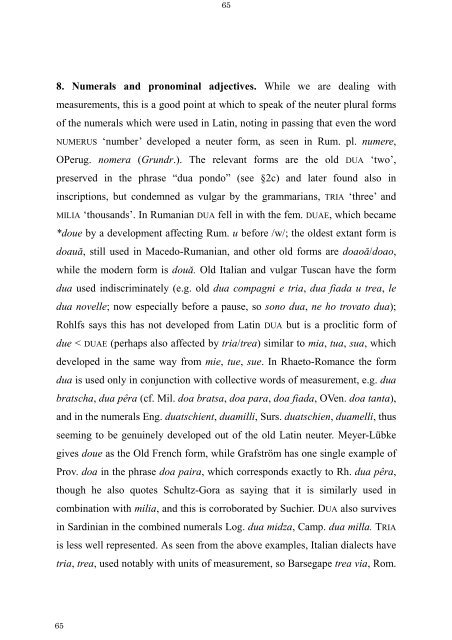The Latin Neuter Plurals in Romance - Page ON
The Latin Neuter Plurals in Romance - Page ON
The Latin Neuter Plurals in Romance - Page ON
You also want an ePaper? Increase the reach of your titles
YUMPU automatically turns print PDFs into web optimized ePapers that Google loves.
65<br />
65<br />
8. Numerals and pronom<strong>in</strong>al adjectives. While we are deal<strong>in</strong>g with<br />
measurements, this is a good po<strong>in</strong>t at which to speak of the neuter plural forms<br />
of the numerals which were used <strong>in</strong> <strong>Lat<strong>in</strong></strong>, not<strong>in</strong>g <strong>in</strong> pass<strong>in</strong>g that even the word<br />
NUMERUS ‘number’ developed a neuter form, as seen <strong>in</strong> Rum. pl. numere,<br />
OPerug. nomera (Grundr.). <strong>The</strong> relevant forms are the old DUA ‘two’,<br />
preserved <strong>in</strong> the phrase “dua pondo” (see §2c) and later found also <strong>in</strong><br />
<strong>in</strong>scriptions, but condemned as vulgar by the grammarians, TRIA ‘three’ and<br />
MILIA ‘thousands’. In Rumanian DUA fell <strong>in</strong> with the fem. DUAE, which became<br />
*doue by a development affect<strong>in</strong>g Rum. u before /w/; the oldest extant form is<br />
doauă, still used <strong>in</strong> Macedo-Rumanian, and other old forms are doaoă/doao,<br />
while the modern form is două. Old Italian and vulgar Tuscan have the form<br />
dua used <strong>in</strong>discrim<strong>in</strong>ately (e.g. old dua compagni e tria, dua fiada u trea, le<br />
dua novelle; now especially before a pause, so sono dua, ne ho trovato dua);<br />
Rohlfs says this has not developed from <strong>Lat<strong>in</strong></strong> DUA but is a proclitic form of<br />
due < DUAE (perhaps also affected by tria/trea) similar to mia, tua, sua, which<br />
developed <strong>in</strong> the same way from mie, tue, sue. In Rhaeto-<strong>Romance</strong> the form<br />
dua is used only <strong>in</strong> conjunction with collective words of measurement, e.g. dua<br />
bratscha, dua pêra (cf. Mil. doa bratsa, doa para, doa fiada, OVen. doa tanta),<br />
and <strong>in</strong> the numerals Eng. duatschient, duamilli, Surs. duatschien, duamelli, thus<br />
seem<strong>in</strong>g to be genu<strong>in</strong>ely developed out of the old <strong>Lat<strong>in</strong></strong> neuter. Meyer-Lübke<br />
gives doue as the Old French form, while Grafström has one s<strong>in</strong>gle example of<br />
Prov. doa <strong>in</strong> the phrase doa paira, which corresponds exactly to Rh. dua pêra,<br />
though he also quotes Schultz-Gora as say<strong>in</strong>g that it is similarly used <strong>in</strong><br />
comb<strong>in</strong>ation with milia, and this is corroborated by Suchier. DUA also survives<br />
<strong>in</strong> Sard<strong>in</strong>ian <strong>in</strong> the comb<strong>in</strong>ed numerals Log. dua midza, Camp. dua milla. TRIA<br />
is less well represented. As seen from the above examples, Italian dialects have<br />
tria, trea, used notably with units of measurement, so Barsegape trea via, Rom.









